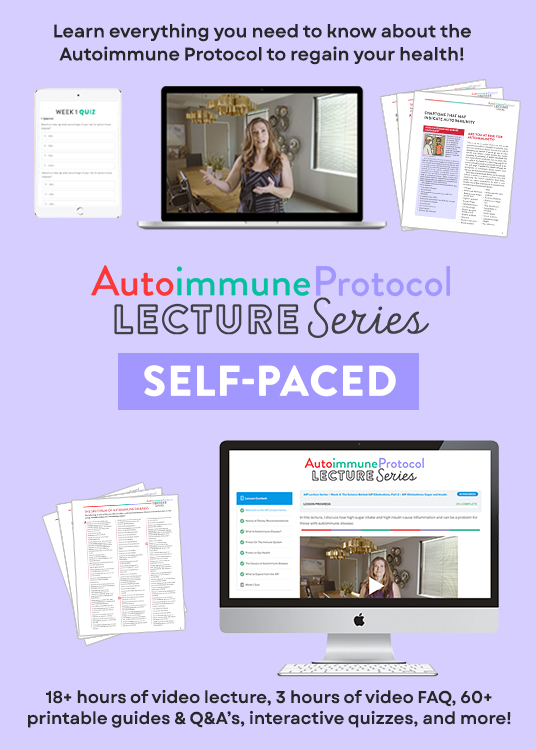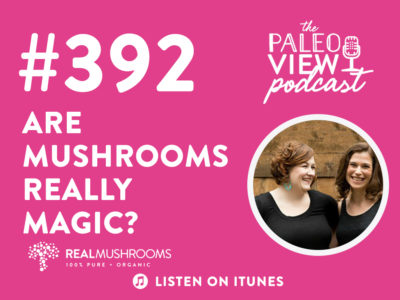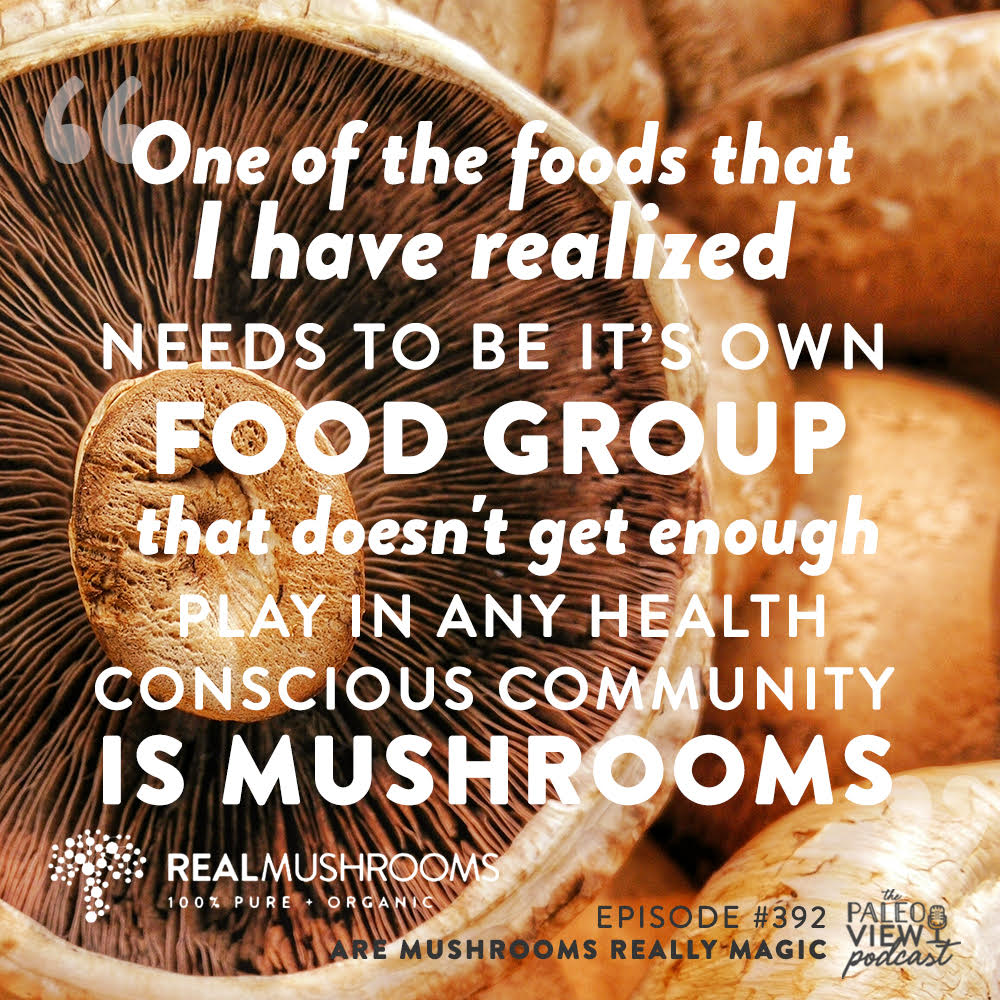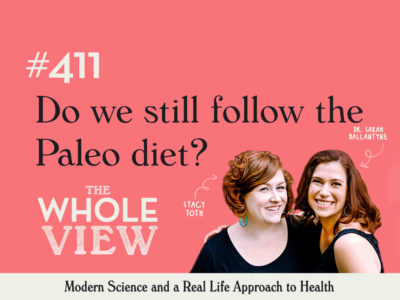On this week’s episode, Stacy and Sarah are nerding out about the health benefits of mushrooms! Since their last mushroom-focused episode, Episode 307, Sarah’s research on mushrooms has led her to consider them to be their own food group! Find out why on Episode 392!
If you enjoy the show, please review it on iTunes!
The Paleo View (TPV), Episode 392: Are Mushrooms Really Magic? Part 2
Introduction (0:44)
- Stacy isn’t in charge this week! Time for Sarah to nerd out!
- Sarah is almost done with her gut microbiome book. She thinks only 2 months before she turns it in.
- Now that she has all this information on the microbiome, it’s now of equal importance as nutrient density.
- “One of the foods that I have realized needs to be its own food group, needs to be emphasized, that just doesn’t get enough play in any health conscious community is mushrooms.”
- We did an episode on mushroom extracts in episode 307, but we only scratched the surface.
- Now we see mushrooms as a foundational food. We’ll explore why in this episode.
- Stacy wants to see if we can figure out why she craves mushrooms with her steak when she has PMS
Sponsored Episode by Real Mushrooms (8:48)
- Real Mushrooms is the premier provider of organic mushroom extracts, verified for the beneficial medicinal compounds like beta-glucans and free from starchy fillers like grains. With over 40 years of mushroom growing experience, Real Mushrooms prides itself on providing a transparent source of medicinal mushrooms that you can trust.
- Sarah has fallen in love with their super high quality, lab tested mushroom extracts as powder or pill or chocolate!
- Landing Page: https://www.realmushrooms.com/lp-thepaleoview/
- Deal: 25% off, no coupon needed
What mushrooms are their own food group (11:41)
- Not a vegetable! Fungus are a different kingdom from plants.
- Unique phytochemicals we can’t get anywhere else: polyphenols, triterpenes.
- Unique fiber we can’t get anywhere else: chitin, beta-glucans, chitosan
- Extremely nutrient dense
- Uniquely beneficial for the gut microbiome (mediates health benefits)
- A 100-gram serving of the least impressive mushroom (the white or common mushroom), raw, contains a whopping 24% of the RDA of vitamin B2, 18% of vitamin B3, 15% of vitamin B5, 16% of copper, 13% of selenium, 9% each of phosphorous and potassium, and smaller but still impressive amounts of vitamins B1, B6, B9, C and D as well as iron, magnesium, manganese and zinc—all for only 22 calories.
- While we don’t count calories, that’s certainly nutrient dense!
- Phytochemicals and fiber are very important for the gut microbiome. And then the gut microbiome breaks down nutrients for us to use.
Phenolic compounds (17:50)
- All antioxidant, anti-inflammatory, and many other beneficial properties.
- protocatechuic acid
- gentisic acid
- gallic acid
- vanillic acid
- p-coumaric acid
- cinnamic acid
- syringic acid
- myricetin
- catechin
Triterpenes (26:37)
- Mushrooms are also particularly rich in triterpenes, which have a variety of properties that are important for cancer prevention, including antiproliferative, antimetastatic, and antiangiogenic.
- About 80 different triterpenes have been isolated from reishi alone, some of which are known to kill liver cancer cells, to inhibit histamine release from mast cells, to have cardioprotective effects and hepatoprotective activity.
Fiber (29:28)
Chitin
- It can only be obtained from mushrooms and other fungi, insect exoskeletons, fish scales, and shellfish shells.
- In studies, chitin has been shown to support the growth of species from Bifidobacterium (including Bifidobacterium animalis), Lactobacillus, Akkermansia, and Bacteroides while also decreasing the abundance of the inflammatory microbe Desulfovibrio.
- In mice, chitin oligosaccharides are also able to modulate the gut microbiota to combat diet-induced metabolic syndrome in mice, inhibiting the destruction of the gut barrier, restoring the Firmicutes to Bacteroidetes ratio to what it was before high-fat feeding,
- At the genus level, chitin fiber dramatically increased levels of Bifidobacterium, Lactobacillus, Akkermansia, and Bacteroides in these mice, while decreasing the abundance of the less favorable Desulfovibrio.
Chitosan
- It is only naturally-occurring in the cell walls of fungi, like mushrooms.
- In mice, chitosan increases gut microbial diversity (along with a general increase in Bacteroidetes and a decrease in Firmicutes) and decreases levels of potentially pathogenic genera Escherichia and Shigella.
- In diabetic mice, chitosan has also been shown to reshape the microbiota to induce an anti-diabetic effect, relieving dysbiosis by raising levels of Akkermansia muciniphilia and suppressing the growth of Helicobacter.
Glucans
- Mushrooms are particularly rich sources of beta-glucans (more specifically (1-3),(1-6)-beta-glucans which are different than the (1,4)-beta-glucans in grains like oats)
- Beta-glucans have been shown to increase levels of Roseburia, Bifidobacterium and Dialister, and in particular the species Eubacterium rectale, Roseburia faecis, and Roseburia intestinalis.
- In a human trial, foods rich in beta-glucan, increased levels of Roseburia hominis, Clostridiaceae (Clostridium orbiscindens and probiotic Clostridium species), and Ruminococcus species, while lowering the levels of Firmicutes and Fusobacteria were lowered. Levels of acetic, butyric, and propionic acids also increased.
- In an extensive review of the health effects of beta-glucan, researchers concluded that this fiber’s actions upon the gut microflora, including enhancing the production of short-chain fatty acids, contributes to its anti-cancer, anti-inflammatory, anti-diabetic, and immune-modulating effects.
FAQs (37:44)
- Taken all together, these unique properties found in no other food elevates mushrooms to their own food group!
Save 70% Off the AIP Lecture Series!
Learn everything you need to know about the Autoimmune Protocol to regain your health!
I am loving this AIP course and all the information I am receiving. The amount of work you have put into this is amazing and greatly, GREATLY, appreciated. Thank you so much. Taking this course gives me the knowledge I need to understand why my body is doing what it is doing and reinforces my determination to continue along this dietary path to heal it. Invaluable!
Carmen Maier

Serving size? Servings per week?
- Let’s look at the science! Servings are defined same way as veggies, 80-100g, one cup raw (a fist-sized amount) or 1/2 cup cooked.
- Cancer studies show highest magnitude of effect in relation to frequent mushrooms consumption. Many (but not all) CVD and T2D studies show null effect in context of SAD diet.
- Compared to participants with mushroom consumption <1 time/week, frequent mushroom intake was associated with a decreased risk of prostate cancer (8% lower with 1–2 times/week, and 17% lower with 3-4/times/week).
- Breast cancer meta-analysis, reduced risk for every gram daily!
Which are best for inflammation or the gut?
- Anti-inflammatory effects have been established across the board, even regular ol’ white mushroom. Best studied for inflammation are reishi, maitake, turkey tail.
- For gut microbiome, each mushroom has a slightly different effect (same as veggies), so variety is the most important.
- Reishi increases Bifidobacteria, Lactobacillus, Roseburia, and Lachnospiraceae in the gut. In mice, these mushrooms have also been reported to reduce obesity through modulation of the gut microbiota. Along with reversing gut dysbiosis in mice, reishi improves gut barrier health.
- Chaga increases Bacteroidetes at the phylum level, bringing the gut microbial profile closer to a healthy composition.
- Turkey tail mushroom supports Bifidobacterium and Lactobacillus species
- Agaricus bisporus (white button mushroom) have been shown to increase microbial diversity, increasing the levels of lactic acid producing bacteria (like Lactobacillus)
- Shiitake mushroom supports a wide range of beneficial bacteria.
- Lion’s mane induces changes in the gut microbiome that increase the bacterial production of nutrients for the host.
- Oyster mushroom stimulates the growth of Bifidobacterium strains
Are Mushrooms bad for people with autoimmune conditions? (55:29)
- First studies done in cancer. Things that fight cancer might increase immune function that might flare autoimmune.
- Recent research shows that mushrooms bring balance rather than stimulate it
- Lots of species have anti-inflammatory effects and reverse dysbiosis. Reishi especially well studies.
- Looks for symptoms to see if you’re effected: brain issues like depression, skin issues, or autoimmune symptoms
- Mushrooms whole have always been a part of AIP.
Do they need to be cooked or can they be eaten raw? (1:03:11)
- With vegetables and seaweeds, cooked versus raw feeds different species, because fiber structure changes with heat. Some nutrients are lost and others are formed, so mixing up raw and cooked is best.
- With mushrooms, we don’t have microbiome data raw versus cooked, but we do have fiber and antioxidant data.
- Cooking increased starch, total dietary fiber (increase in insoluble, decrease in soluble, decrease in chitin), and acid-hydrolysed fat but decreased crude protein and chitin concentrations (loss of water, plus molecular transformation).
- Boiling, microwaving, grilling, vs deep frying
- Cooking in general increases alpha and beta glucans.
- Decreases total polyphenols and most measures of antioxidant activity.
Can they cause gut issues? SIBO? candida? digestive issues – diarrhea, pain? (1:05:48)
- Actually, studies that mushroom extracts kill candida. Reishi especially well studies. Inhibits candida:
- Digestive issues as a result of eating mushrooms would be caused by an allergy.
Can they be eaten by people who have histamine intolerance? (1:08:16)
- Often due to gut dysbiosis. So mushrooms would help
- Certainly, histamine content of foods varies and not all foods have been measured, but a 1997 paper showed 3 mushroom varieties were low in histamine,
- Some mushroom extracts have been shown to reduce allergy (histamine), eg. hen of the woods and chaga
- Sarah’s mushroom posts: The Power of Medicinal Mushrooms and Elevating Mushrooms to Food Group Status
- Sponsored Episode by Real Mushrooms
- Landing Page: https://www.realmushrooms.com/lp-thepaleoview/
- Deal: 25% off, no coupon needed
Thanks for listening! (1:15:43)










